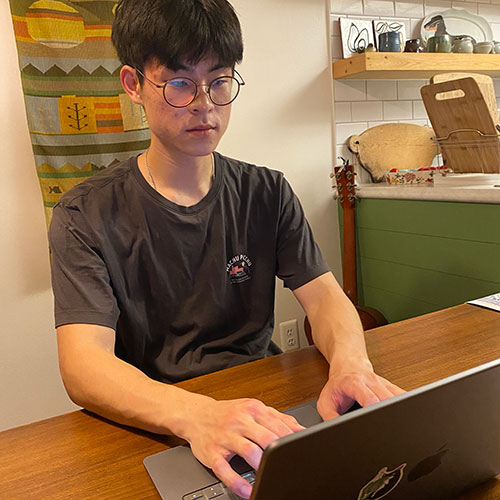
Biology major learns new software to contribute to genetic research during APEX fellowship

Jiho Park ’25, a biology major at The College of Wooster, completed an APEX fellowship at the University of Pittsburgh researching kidney disease genetics, aiding pharmaceutical studies on fibrosis, and developing an educational computational biology module for high school students. His research included learning new computer software which he used to analyze RNA data. With the help of his fellowship mentor, Brooke Krause, associate professor of economics and business economics, Park overcame the challenges of his technical internship, to ultimately make contributions to important biological research.
“I learned new areas of single-cell analysis and simulation at the molecular level. I enjoyed dealing with the big data of the RNA and interpreting the cellular phenomena from different perspectives.”
— Jiho Park ’25
Q: Why was your APEX fellowship position a good fit for you?
Park: I was provided this resource by Erzsebet Regan, Whitmore-Williams associate professor of biochemistry and molecular biology. I searched for professors that I wanted to work with at the University of Pittsburgh and reached out to one for the opportunity to work with them. It was a good fit for me because the research was cellular level research which employed software that was based on machine learning. I am interested in biology and computer science, and I was fascinated by this research opportunity.
Q: What interests you most about the work you did?
Park: I was most interested in learning how to process the RNA data utilizing the public software that is used by many scientists. Once I learned how to use the software, I could apply the gained knowledge to process and analyze the RNA data.
Q: What are some skills you’ve learned that you see yourself carrying forward in your career?
Park: I learned how to teach myself. Employing software that I never used was challenging, but I successfully taught myself the software from internet resources. I will face new challenges in my career in terms of new software that I need to use, and now I know I will be able to search and learn it so that I can successfully use software for future research.
Q: How has the internship helped you to see what’s next for you?
Park: I learned new areas of single-cell analysis and simulation at the molecular level. I enjoyed dealing with the big data of the RNA and interpreting the cellular phenomena from different perspectives. In my future career, I want to pursue computational biology of machine learning.
Posted in Experiential Learning on August 10, 2024.
Related Posts
Related Areas of Study
Biology
Explore molecular and cellular biology, ecology and more with top faculty and access to extensive lab facilities.
Major Minor

